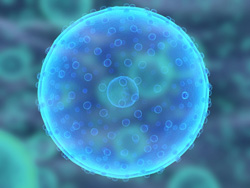Regulating protein traffic in cells
The cell is a dynamic environment that needs to import and export molecules. Transporting materials to the inside requires a way round the fact that the cell membrane is impermeable to large polar molecules such as proteins. Accomplishing this task for the cell, the process of endocytosis involves the remodelling of the restricting membrane. together with actin which forms a cytoskeleton, myosin plays a part in membrane reshaping and deformation to form vesicles. At the plasma membrane, for example, invagination forms endosomes. However, the role of myosin 1 and actin in remodelling intracellular membrane systems such as the trans-Golgi network (TGN) have so far remained unknown. the EU-funded project 'Identification of the molecular mechanisms whereby actin and myosin1b shape sorting endosomes' (Endomyoshape) aimed to dig into the molecular mechanics of endosome formation at the TGN. The scientists focused on the role of a myosin 1 protein, Myo1b, in the regulation of endocytosis. endomyoshape found a pool of Myo1b at the TGN and demonstrated that this particular myosin, together with the actin cytoskeleton, promotes the formation of tubular carrier precursors arising from the TGN. Myosin1b generates a force that controls the assembly of F-actin foci and, together with the actin cytoskeleton, promotes the formation of tubules. the project has therefore provided evidence that actin and myosin1b regulate organelle shape and initiate post-Golgi carrier formation by regulating actin assembly and remodelling of TGN membranes. uncovering the regulation of endocytic trafficking promises to be the key to many diseases. Some bleeding and pigmentation disorders, forms of neuropathy, kidney disease and blindness are part of this huge array. A number of cancers are also associated with defective modulation of the endocytic pathway.







